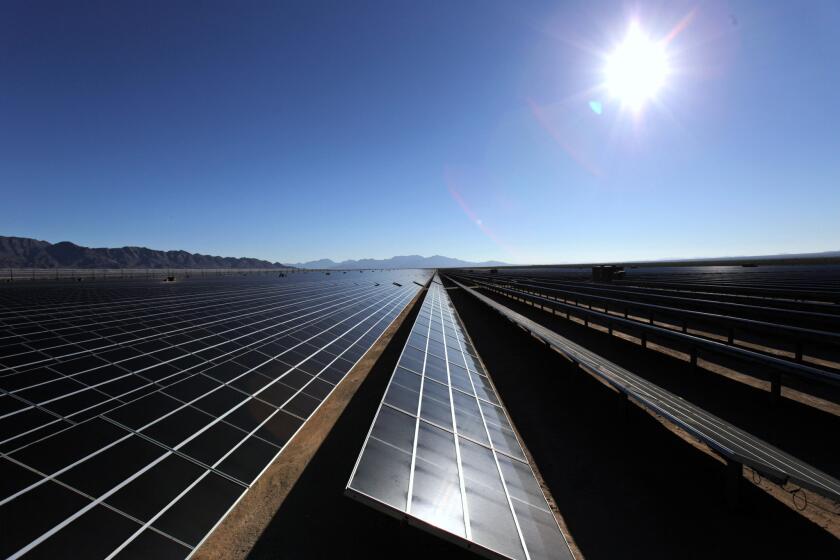Editorial: Fossil fuels and nativism: Trump is using coronavirus to push through his draconian agenda
President Trump has fought long and hard to curtail immigration to the United States, particularly from those seeking asylum or refugee status, for which he has (rightfully) drawn lawsuits and political opposition. But now the COVID-19 pandemic has given the president a smattering of cover for an asylum-limiting policy he was having trouble enacting. As part of a broader shutdown last month to nonessential traffic across the Canada and Mexico borders, agents now turn back people caught crossing the border regardless of whether they qualify for asylum or any other form of humanitarian relief.
Was that a prudent way to shield Americans from COVID-19? Not really. At best, experts say, the intervention merely slows the virus down. And at the time of Trump’s order, there were already more than 10,000 reported COVID-19 cases in the U.S. The virus apparently arrived here in December or January, carried in by travelers from China and other outbreak hot spots before Trump moved to screen the health of incoming travelers and, eventually, to restrict entry. But the genie was already out of the bottle by then. And despite that stated desire to stymie the spread of the virus, the administration still conducts many deportation proceedings in often crowded courtrooms, and has rejected calls to release migrants from its overcrowded detention system, potentially exposing tens of thousands of people to the virus.
Beyond that, Trump has cited the pandemic as another reason to extend the wall along the U.S.-Mexico border, a pet project and campaign promise that is opposed by a majority of Americans. “We will do everything in our power to keep the infection and those carrying the infection from entering our country,” Trump said. But experts say there is no link between a border wall and controlling a pandemic.
The world relies too much on fossil fuels, but nearly 75% of new electricity generation capacity last year used renewable energy. Great. Let’s do better.
Sadly, shutting off asylum requests at the Southwest border isn’t the only policy issue the Trump administration has advanced under the banner of protecting the country against COVID-19. Last month, the Environmental Protection Agency announced that it would suspend indefinitely many key regulatory enforcement efforts in recognition of the pandemic’s effect on businesses, laboratories and other entities involved in evaluating and complying with environmental laws.
That seems like reasonable grounds for offering extensions, for instance, but not to announce that “the EPA does not plan to ask facilities to ‘catch-up’ with missed monitoring or reporting” on many pollution readings. That’s essentially telling industry that the beat cop is taking some time off but will be back eventually and then will start keeping an eye on you. “This EPA statement is essentially a nationwide waiver of environmental rules for the indefinite future,” Cynthia Giles, who led the EPA’s Office of Enforcement during the Obama administration, told The Hill. “And it allows them an out on monitoring too, so we may never know how bad the violating pollution was.”
Meanwhile, over at the Bureau of Land Management, lease sales for oil, gas and other extractive industries on public lands have continued. Are we to assume that workers involved in preparing, submitting, and assessing lease bids are immune to COVID-19? Because offering new oil and gas leases in the midst of a global glut of oil doesn’t seem like an essential service — unless, of course, your administration’s policy is to maximize oil and gas production.
Several agencies also announced that they would take steps to make it easier for some industries to operate during the COVID-19 emergency, including a proposal to fast-track regulatory requests at the Federal Energy Regulatory Commission (which oversees pipelines, among other industry infrastructure) and a plan to allow disposal of some low-level nuclear wastes at municipal landfills instead of licensed nuclear waste facilities.
The court’s slapdash intervention didn’t serve the Constitution, just the GOP’s chances in one election. Sound familiar?
Elsewhere, the administration took the opportunity to advance other key Trump policy issues, including finalizing a rollback of Obama-era auto mileage rates, moving forward with a controversial program opposed by Congress to partially replace food stamps for poor families with boxes of food, and temporarily halting votes by workers to unionize — a move the National Labor Relations Board was forced to abandon after a flurry of protests.
It’s possible that the Trump administration is weighing policy decisions based on the unique risks and burdens posed by COVID-19 and reflecting its responsibility to keep the federal government running as best as possible. But this is the Trump administration, which has proved time and again that skepticism about its motives is, unfortunately, justified.
More to Read
A cure for the common opinion
Get thought-provoking perspectives with our weekly newsletter.
You may occasionally receive promotional content from the Los Angeles Times.












